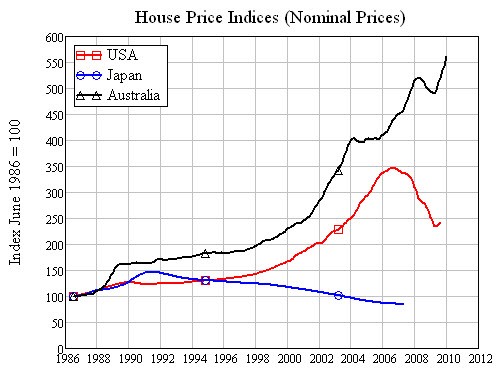Last week I took part in a debate entitled “The Great Residential Housing Debate — the next Bubble or a legitimate Boom?” at the annual conference for Perennial Investment Partners; I put the Bubble case and Chris Joye, of Rismark International, presented the Boom case (here is my paper and my presentation). As is well-known, Australia is one of the few countries in the OECD not to experience two quarters or more of falling GDP as a result of the GFC, and probably the only country that has not experienced a fall in its property market.
The conference was held twice, first in Melbourne on Wednesday February 24, and then in Sydney on the 26th. There were about 400 people in the audience on both occasions, all of whom were customers of Perennial — with the majority (roughly 75%) being financial planners. The conference employed an electronic voting mechanism that let participants answer general questions, as well as rate the speakers. In our debate, it was used to work out where people stood on the “Bubble vs Boom” spectrum before and after the debate. A “1” indicated a complete bear who expected property to crash and advised getting out now, while a “10” was a complete bull who advised “buy, buy, buy”.
Before our debate in Melbourne, the average score was 4.9. This surprised me, because I expected the audience to be generally pro-property; however a score of below 5.5 indicated that overall the audience was bearish on property (since the average of the numbers from 1 to 10 is 5.5; also see ** below).
After our debate, the score was 5.2 — a small move in favour of the bullish position, but still slightly in the bearish camp. Chris commented that this was “about even” and “too close to call” as he left the stage, which I thought was a fair enough summary of the outcome.
Read the rest of this article at Steve Keen’s Debtwatch blog








Australian property may well be a bubble but comparing it to Japan, which has been in recession for about two decades and the USA which was hit so hard by the collapse of ninja loans which don’t exist to the same degree in Australia, delivers no insight at all. If anything it degrades the quality of the whole issue by by making one wonder what data has been excluded because it does not fit the favoured agrument. What has property done in Canada? New Zealand? England? France? China? India? Korea?